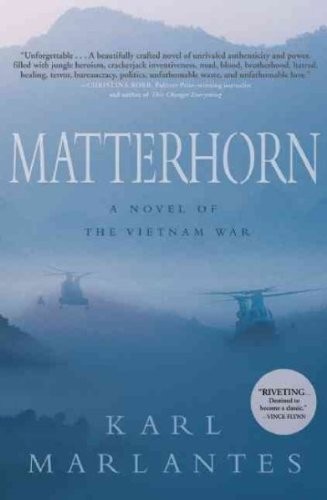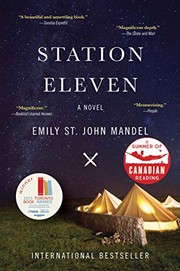dare rated Matterhorn: 4 stars

Matterhorn by Karl Marlantes
Intense, powerful, and compelling, Matterhorn is an epic war novel in the tradition of Norman Mailer's The Naked and the …
Roolipelaaja, seikkailuharrastaja, spefi-kirjailija
Puran ahdistustani välillä fediversessä: kamu.social/@dare
This link opens in a pop-up window
Success! dare has read 43 of 40 books.

Intense, powerful, and compelling, Matterhorn is an epic war novel in the tradition of Norman Mailer's The Naked and the …

Intense, powerful, and compelling, Matterhorn is an epic war novel in the tradition of Norman Mailer's The Naked and the …
I was torn between three and four stars. Finally ended up giving four, since I honestly enjoyed the book so much three would have just been being a sourpuss. Captain Vorpatril's Alliance is a lot of fun.
It has its problems - the middle part sags, and I'd rather have been spared the Vorkosigan's Greatest Hits section, where characters from previous books are paraded out just so that the present protagonists can gawk at the awesome stuff they've done. Problem is, the reader already knows all this, so the whole section comes off a bit as "you thought this was great the first time, so let's go over it again". Which is really unnecessary. As much as I love Miles Vorkosigan - particularily the young, over-energetic, forward-momentum-and-damn-the-consequences Miles, his cameo here doesn't add anything to the book.
But enough grumbling. Ivan Vorpatril makes a nice protagonist, and the twin plots …
I was torn between three and four stars. Finally ended up giving four, since I honestly enjoyed the book so much three would have just been being a sourpuss. Captain Vorpatril's Alliance is a lot of fun.
It has its problems - the middle part sags, and I'd rather have been spared the Vorkosigan's Greatest Hits section, where characters from previous books are paraded out just so that the present protagonists can gawk at the awesome stuff they've done. Problem is, the reader already knows all this, so the whole section comes off a bit as "you thought this was great the first time, so let's go over it again". Which is really unnecessary. As much as I love Miles Vorkosigan - particularily the young, over-energetic, forward-momentum-and-damn-the-consequences Miles, his cameo here doesn't add anything to the book.
But enough grumbling. Ivan Vorpatril makes a nice protagonist, and the twin plots held my interest better than, say, Diplomatic Immunity or Cryoburn. The beginning is good, the ending is good and the character dynamics worked. This is essentially a caper novel, and being that, doesn't take itself too seriously, nor let things get too dark.
Invisible Sun is not perfect, but it's perfect for me.
The Empire Games trilogy comes to a very satisfying conclusion in this doorstopper of a sci-fi thriller, as multiple plots on multiple timelines collide in a Last Plan Standing kind of situation. The paranoid police state of divergent USA and the fledgling democracy of the NAC have set their schemes in motion and Invisible Sun is all about resolution and payoff. It's competence porn with an incredibly high level of detail, but I cared about the characters and I cared about the big picture and as a result the incredibly tense story worked like gangbusters.
Some will object to the infodumps (I don't), and there is a spattering of editorial carelessness, but this may still be my favourite Charles Stross book of all time.
This is probably someone's favourite book of the year. It's not mine - it's pretty far from the kind of stuff I usually love - and I was still really impressed and moved.
A love story with a backdrop of a paradimensional war, with the focus on beautiful writing and all the worldbuilding strictly as an afterthought. This is a novel that knows exactly what it wants to be and succeeds in that admirably. There's nothing superfluous here, only beautiful prose and a story that cannot but end tragically. Maybe.
Usually I prefer my superheroics to take place in a recognisable world, and see all actual worldbuilding as needless extra effort. See These Bones wouldn't work without the post-apocalyptic worldbuilding, however, and it's all the better for having it. Likeable yet very flawed characters, bad thingss happening to good people consistently but still somehow not unfairly, and superpowered action that feels crunchy and dangerous. Very much my kind of book.

Intense, powerful, and compelling, Matterhorn is an epic war novel in the tradition of Norman Mailer's The Naked and the …

The international publishing sensation now available in paperback: an audacious, darkly glittering novel about art, fame and ambition, set in …
Content warning Spoilers ahoy
I'm of two minds of this one.
Surface stuff first: there's a post-apocalyptic wasteland, magitech, fantasy stuff in a vaguely sci-fi world. There's characters who are likeable, if occasionally a bit tedious in their sense of worthlessness. But the main event is a love triangle.
Road to Ruin reads like fanfiction of itself, if such a thing is possible. And yet, this is not a bad thing. My general feeling about fanfic is that it's intended to give its readers what they cannot have in canon. This is not condemnation, nor do I claim to know much about fanfic, but the few times I read it, that is my reason. What basically no stories outside of fanfic ever gives me as a reader is poly romance (there's a couple of exceptions - Sense8 and the Fans webcomic come to mind).
A sister trope to Bury Your Gays is killing the third wheel, making sure that the alpha couple get their happy ending, and the one messing up the matters dies conveniently. Reading Road to Ruin poly-baited me all the way to the end, until ... well, it didn't kill the third wheel, but it didn't quite give me the sappy three-person romantic happy ending I'd been craving.
A happy ending for non-straight, non mono-folk is important because of representation. I want to see poly romance in fiction, and not just as tragedy. Sure there's polycules -- established polycules -- in the background in a lot of stories, like the Expanse, but they are like gay background charcters in the nineties, just there for colour. I want to read about the journey and the experience.
Road to Ruin almost goes there. It quite doesn't, and I kind of hate it for it. Do not polybait me, Hana Lee! Then again, this might be because the journey is still ongoing. Maybe it's not supposed to be a piece of feel-good indulgence, maybe it's supposed to be the start of a long story. I'm choosing to believe this and rating the book accordingly. If it turns out I'm wrong, I'll be returning with furious judgement.